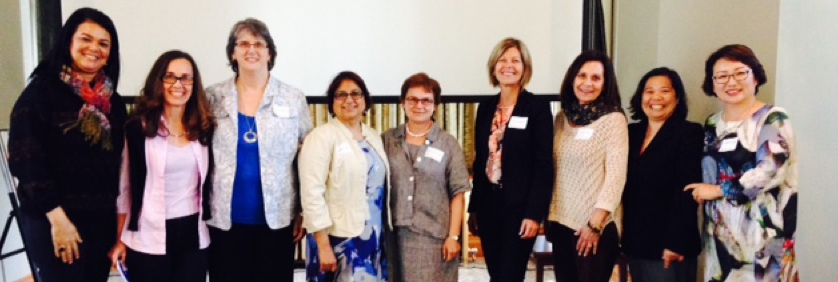 How has Flexible Learning been implemented at SoN?
How has Flexible Learning been implemented at SoN?
Ask Maura MacPhee, Cathy Ebbehoj, Cheryl Segaric, Joanne Ricci and Ranjit Dhari—SoN Faculty– who were on centerstage at the recent annual UBC CTLT Institute.
Presenting to audience from various faculties across campus, our SoN faculty outlined the process of revising their courses to include FL, and shared lessons learned from that process.
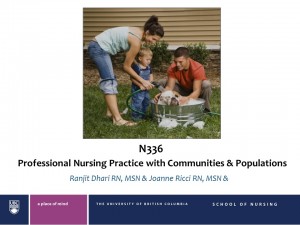 Maura MacPhee provided an overview of the nursing undergraduate curriculum, funding of the SoN FL initiative through the UBC Teaching and Learning Enhancement Fund (TELF), as well as implementation and evaluation of SoN FL projects.
Maura MacPhee provided an overview of the nursing undergraduate curriculum, funding of the SoN FL initiative through the UBC Teaching and Learning Enhancement Fund (TELF), as well as implementation and evaluation of SoN FL projects.
For Ranjit Dhari and Joanne Ricci, course leaders for N336 (Professional Nursing Practice with Communities and Populations), FL was a solution in addressing faculty burnout, challenges in guest speaker scheduling and course content variability across 6-week sessions. Focusing on two modules, Nutrition and Dental Public Health, they produced videos of guest speakers and posted these online. Content was organized by population groups: 0-6 months, toddler-presc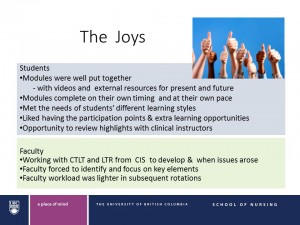 hooler, school-age and adolescent. Guiding questions were embedded, and the “hour long talking head” was spliced into 15 minute video “chunks” for students to have a better viewing experience. Evaluation is currently ongoing, comparing student outcomes between the traditional class (homework, lecture, in-class discussion, questions on final exam) and the FL class (online modules with guiding questions, embedded questions, in-class case discussion and questions on final exam).
hooler, school-age and adolescent. Guiding questions were embedded, and the “hour long talking head” was spliced into 15 minute video “chunks” for students to have a better viewing experience. Evaluation is currently ongoing, comparing student outcomes between the traditional class (homework, lecture, in-class discussion, questions on final exam) and the FL class (online modules with guiding questions, embedded questions, in-class case discussion and questions on final exam).
Cathy Ebbehoj, course leader for N333 (Professional Practice with Childbearing Individuals and Families) together with Farah Jetha, converted their Infant Feeding module. A slide show with lecture notes, curated videos, links to references and resources, embedded questions and a quiz were the main components of the online module. The course content was divided into five sub-topics that began with the overarching foundational knowledge providing students the opportunity to experience the content through a global lens. Diagrams around the physiology of breastfeeding—and some additional notes—were included to provide students in-depth information which many families in the community currently expect to receive fro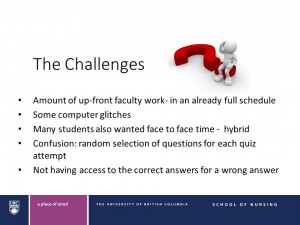 m health providers. At the end of each of the five sub-topics, an 8-10 question quiz was used to assess the students’ understanding of the material presented online. Students were required to obtain 80%, awarded 1 point for each sub-topic. Those who scored less than 80% after 3 attempts were given participatory points of 0.5 for that sub-topic. Online content was reinforced in discussions during the clinical and post-conference meetings. See the slides for the challenges and joys which Cathy and Farah encountered in developing their FL module.
m health providers. At the end of each of the five sub-topics, an 8-10 question quiz was used to assess the students’ understanding of the material presented online. Students were required to obtain 80%, awarded 1 point for each sub-topic. Those who scored less than 80% after 3 attempts were given participatory points of 0.5 for that sub-topic. Online content was reinforced in discussions during the clinical and post-conference meetings. See the slides for the challenges and joys which Cathy and Farah encountered in developing their FL module.
Cheryl Segaric, course leader for N303 (Introduction to Professional Nursing Practice with Adults, Older Adults, and their Families), was among the first instructors to implement Flexible Learning in the SoN. She replaced 12 hours of in-class content with online learning in Fall 2013. The 3 main content areas “flipped” were: COPD (3 hours), Diabetes (3 hours), Stroke (3 hours) + 3 hours in leiu of workload. Cheryl is currently preparing for the third offering of the FL modules. Working with a large class of 120, Cheryl 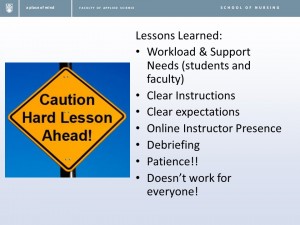 divided the students in 20 groups. The students reviewed online case studies using the “Canadian Neighbourhood” (a virtual community) and responded to guided questions in a designated online group discussion forum. The groups then provided a summary at the end of the case. As a recap, students view a powerpoint presentation highlighting key points and complete an in-class quiz.
divided the students in 20 groups. The students reviewed online case studies using the “Canadian Neighbourhood” (a virtual community) and responded to guided questions in a designated online group discussion forum. The groups then provided a summary at the end of the case. As a recap, students view a powerpoint presentation highlighting key points and complete an in-class quiz.
Even with a variety of minor challenges with technology, anecdotal feedback from Cheryl’s class has been mixed but generally positive. Cheryl continuously refines the modules for each offering and is looking into more formal evaluation of her FL modules, focusing on gathering evidence to support the belief that students are engaging with course content at a higher and more meaningful (applied) way. In the planning stage is also a research project which will examine the nature of learning using the Canadian Neighbourhood (online unfolding case study) and online discussion forum using guided questions. Check out lessons learned from Cheryl’s FL initiative here.
